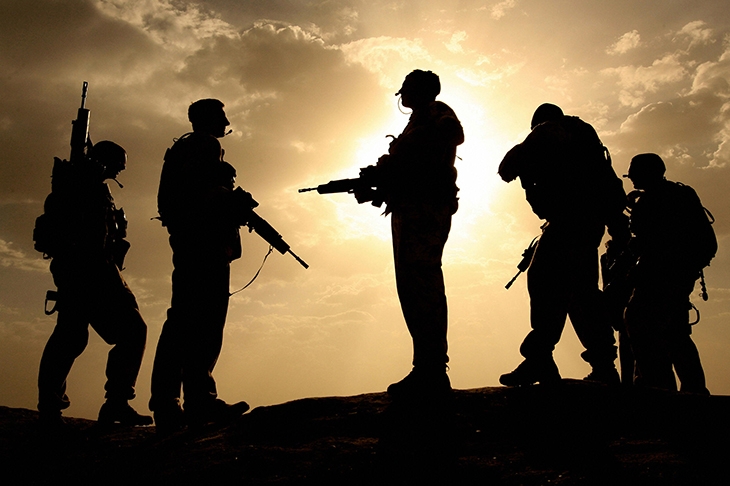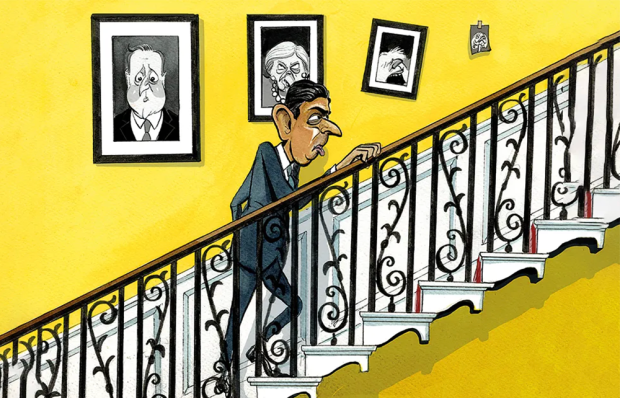Two important studies have been published this autumn on the apparent failure of our almost 20-year war in Afghanistan. In the Times Literary Supplement my friend Rory Stewart has been reviewing The Afghanistan Papers by Craig Whitlock; and last week I went along to the launch at the Frontline Club in Paddington of the BBC correspondent David Loyn’s The Long War, my copy of which has just arrived. Both look like brilliant accounts of what went wrong, both will surely prove useful guides to a lamentable episode in modern statecraft, but both — and Rory too in his own TLS assessment and recommendations — appear to me to be missing the point.
These three writers have become so close, so engaged, for so long, to a knot of truly Gordian complexity, that they have missed the Gordian solution. Give up.
Depressing, scathing, indignant though in their different ways Loyn, Stewart and Whitlock seem to be, they share (with so much post-pullout analysis of the conflict) a curious if unstated positivity: that we should have risen differently to this challenge; and if we had, it could be met.
I have had time so far to skim the Loyn book, whose broad thrust I heard him outline at the Frontline Club last week. Mr Loyn has been in Afghanistan every year since the start of the conflict and he’s one of the best-informed correspondents we have. He digs deep, he has interviewed many Afghan and western military leaders, and his analysis is detailed, calm and careful. But listening to him brought back my own youth, spent during the last gasp of British colonial history.
Loyn says we and the Americans should have immersed ourselves much more deeply in Afghan society and governance, and at every level, including the more local level. We should have taught ourselves where the levers of power and influence lay, studied more carefully the many-stranded nature of the country’s culture and tribal mix. We should, in short, have understood better what was going on beneath the surface. We needed better language skills. We should have been patient. We should have been everywhere. We should have understood that it could never work if done only top-down. We should have got a grip.
Loyn makes his case well (and I do not, incidentally, think that Rory Stewart — who has, over many years of work in Afghanistan, immersed himself in much the way Loyn recommends — would disagree).
But isn’t this what a competent imperial power does? At our most effective in the 19th and early 20th centuries, isn’t this how Britain governed our once-vast empire: by a shrewd and informed balance of light-touch but deep-sourced involvement, with listening posts — district officers, district commissioners — everywhere? The $3 trillion spent on our 20-year effective occupation of Afghanistan, had it been spent in a manner more resembling how we governed India and maintained protectorates like Swaziland, where I was educated, would surely have purchased a more permanent stabilisation than we have achieved. It would, too, have better embedded western principles of public administration, as well as spread our values. But this would have taken a long time (Loyn and Stewart both acknowledge this) and we’d have needed to be in it for the very long haul. In time, questions about how to fund this permanently would have arisen, and a powerful case would be made for harvesting some of the profits from the extraction of (for instance) mineral resources…
And bingo! — you have a colony. And I might make the case for a new, enlightened, altruistic, multilateral, post-imperial kind of imperialism, if making such a case were even worth trying. But it isn’t. I recognise in myself, and believe I recognise in Rory, a certain nostalgia for the world of our fathers, and a buried vein of neo-imperialism; but we are spitting into the wind. Let it go.
Craig Whitlock’s book is different. As Stewart explains, the author has got his hands on the very extensive confidential research done by Washington’s SIGAR — the Special Inspector-General for Afghan Reconstruction — which was bravely tasked with the job of finding out what was going wrong. Whitlock concludes (writes Stewart) that SIGAR’s ‘unifying belief’ was that ‘all failure was due to a lack of planning’. But as Stewart quite devastatingly sets out, ‘every Afghan ministry was carpeted with strategies. Every general brought in new teams to develop more and more plans and assessments, expressed in hundreds of PowerPoint presentations’ (on my own visits to Afghanistan I must have seen dozens of these) and ‘whatever allowed the Taliban to win, it was not that they put more effort into planning’.
So there were plans galore. And it strikes me that the existence of myriad and often conflicting plans may be not so much cause as consequence. We all know that the more various cures for an ailment you can find on the internet, the likelier it is that the ailment is incurable. Plans to stabilise and modernise Afghanistan may be in the same case.
Rory ends by suggesting that since, before the pullout, 2,500 US troops were maintaining order in Afghanistan, we could have kept them there long-term, as America keeps 25,000 troops in South Korea. But I doubt the Korean situation is comparable; surely the small troop numbers in Afghanistan could only keep control while the Taliban were relatively quiescent, awaiting the promised US pullout.
I conclude that Whitlock’s analysis, that we needed a better plan, falls short of recommending one. Loyn’s analysis — that we failed to dig down, localise, familiarise and get a grip — does point towards such a plan, but the plan is too close to a deep and long-term occupation to command assent. And that Rory would have made an excellent governor of Afghanistan. But that all three writers should face up to the possibility that, given the situation, we should never have gone in in the first place.
Got something to add? Join the discussion and comment below.
Get 10 issues for just $10
Subscribe to The Spectator Australia today for the next 10 magazine issues, plus full online access, for just $10.
You might disagree with half of it, but you’ll enjoy reading all of it. Try your first month for free, then just $2 a week for the remainder of your first year.















Comments
Don't miss out
Join the conversation with other Spectator Australia readers. Subscribe to leave a comment.
SUBSCRIBEAlready a subscriber? Log in